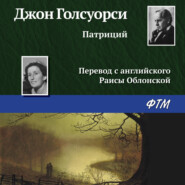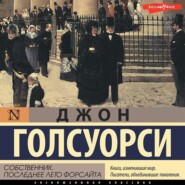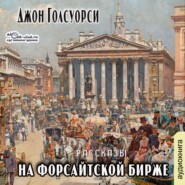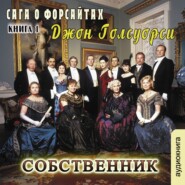По всем вопросам обращайтесь на: info@litportal.ru
(©) 2003-2024.
✖
Villa Rubein, and Other Stories
Настройки чтения
Размер шрифта
Высота строк
Поля
Presently noticing that Harz was looking at a photograph, he said: “Ah! yes! that was a woman! They are not to be found in these days. She could dance, the little Coralie! Did you ever see such arms? Confess that she is beautiful, hein?”
“She has individuality,” said Harz. “A fine type!”
Herr Paul blew out a cloud of smoke.
“Yes,” he murmured, “she was fine all over!” He had dropped his eyeglasses, and his full brown eyes, with little crow’s-feet at the corners, wandered from his visitor to his cigar.
‘He’d be like a Satyr if he wasn’t too clean,’ thought Harz. ‘Put vine leaves in his hair, paint him asleep, with his hands crossed, so!’
“When I am told a person has individuality,” Herr Paul was saying in a rich and husky voice, “I generally expect boots that bulge, an umbrella of improper colour; I expect a creature of ‘bad form’ as they say in England; who will shave some days and some days will not shave; who sometimes smells of India-rubber, and sometimes does not smell, which is discouraging!”
“You do not approve of individuality?” said Harz shortly.
“Not if it means doing, and thinking, as those who know better do not do, or think.”
“And who are those who know better?”
“Ah! my dear, you are asking me a riddle? Well, then – Society, men of birth, men of recognised position, men above eccentricity, in a word, of reputation.”
Harz looked at him fixedly. “Men who haven’t the courage of their own ideas, not even the courage to smell of India-rubber; men who have no desires, and so can spend all their time making themselves flat!”
Herr Paul drew out a red silk handkerchief and wiped his beard. “I assure you, my dear,” he said, “it is easier to be flat; it is more respectable to be flat. Himmel! why not, then, be flat?”
“Like any common fellow?”
“Certes; like any common fellow – like me, par exemple!” Herr Paul waved his hand. When he exercised unusual tact, he always made use of a French expression.
Harz flushed. Herr Paul followed up his victory. “Come, come!” he said. “Pass me my men of repute! que diable! we are not anarchists.”
“Are you sure?” said Harz.
Herr Paul twisted his moustache. “I beg your pardon,” he said slowly. But at this moment the door was opened; a rumbling voice remarked: “Morning, Paul. Who’s your visitor?” Harz saw a tall, bulky figure in the doorway.
“Come in,” called out Herr Paul. “Let me present to you a new acquaintance, an artist: Herr Harz – Mr. Nicholas Treffry. Psumm bumm! All this introducing is dry work.” And going to the sideboard he poured out three glasses of a light, foaming beer.
Mr. Treffry waved it from him: “Not for me,” he said: “Wish I could! They won’t let me look at it.” And walking over, to the window with a heavy tread, which trembled like his voice, he sat down. There was something in his gait like the movements of an elephant’s hind legs. He was very tall (it was said, with the customary exaggeration of family tradition, that there never had been a male Treffry under six feet in height), but now he stooped, and had grown stout. There was something at once vast and unobtrusive about his personality.
He wore a loose brown velvet jacket, and waistcoat, cut to show a soft frilled shirt and narrow black ribbon tie; a thin gold chain was looped round his neck and fastened to his fob. His heavy cheeks had folds in them like those in a bloodhound’s face. He wore big, drooping, yellow-grey moustaches, which he had a habit of sucking, and a goatee beard. He had long loose ears that might almost have been said to gap. On his head there was a soft black hat, large in the brim and low in the crown. His grey eyes, heavy-lidded, twinkled under their bushy brows with a queer, kind cynicism. As a young man he had sown many a wild oat; but he had also worked and made money in business; he had, in fact, burned the candle at both ends; but he had never been unready to do his fellows a good turn. He had a passion for driving, and his reckless method of pursuing this art had caused him to be nicknamed: “The notorious Treffry.”
Once, when he was driving tandem down a hill with a loose rein, the friend beside him had said: “For all the good you’re doing with those reins, Treffry, you might as well throw them on the horses’ necks.”
“Just so,” Treffry had answered. At the bottom of the hill they had gone over a wall into a potato patch. Treffry had broken several ribs; his friend had gone unharmed.
He was a great sufferer now, but, constitutionally averse to being pitied, he had a disconcerting way of humming, and this, together with the shake in his voice, and his frequent use of peculiar phrases, made the understanding of his speech depend at times on intuition rather than intelligence.
The clock began to strike eleven. Harz muttered an excuse, shook hands with his host, and bowing to his new acquaintance, went away. He caught a glimpse of Greta’s face against the window, and waved his hand to her. In the road he came on Dawney, who was turning in between the poplars, with thumbs as usual hooked in the armholes of his waistcoat.
“Hallo!” the latter said.
“Doctor!” Harz answered slyly; “the Fates outwitted me, it seems.”
“Serve you right,” said Dawney, “for your confounded egoism! Wait here till I come out, I shan’t be many minutes.”
But Harz went on his way. A cart drawn by cream-coloured oxen was passing slowly towards the bridge. In front of the brushwood piled on it two peasant girls were sitting with their feet on a mat of grass – the picture of contentment.
“I’m wasting my time!” he thought. “I’ve done next to nothing in two months. Better get back to London! That girl will never make a painter!” She would never make a painter, but there was something in her that he could not dismiss so rapidly. She was not exactly beautiful, but she was sympathetic. The brow was pleasing, with dark-brown hair softly turned back, and eyes so straight and shining. The two sisters were very different! The little one was innocent, yet mysterious; the elder seemed as clear as crystal!
He had entered the town, where the arcaded streets exuded their peculiar pungent smell of cows and leather, wood-smoke, wine-casks, and drains. The sound of rapid wheels over the stones made him turn his head. A carriage drawn by red-roan horses was passing at a great pace. People stared at it, standing still, and looking alarmed. It swung from side to side and vanished round a corner. Harz saw Mr. Nicholas Treffry in a long, whitish dust-coat; his Italian servant, perched behind, was holding to the seat-rail, with a nervous grin on his dark face.
‘Certainly,’ Harz thought, ‘there’s no getting away from these people this morning – they are everywhere.’
In his studio he began to sort his sketches, wash his brushes, and drag out things he had accumulated during his two months’ stay. He even began to fold his blanket door. But suddenly he stopped. Those two girls! Why not try? What a picture! The two heads, the sky, and leaves! Begin to-morrow! Against that window – no, better at the Villa! Call the picture – Spring…!
IV
The wind, stirring among trees and bushes, flung the young leaves skywards. The trembling of their silver linings was like the joyful flutter of a heart at good news. It was one of those Spring mornings when everything seems full of a sweet restlessness – soft clouds chasing fast across the sky; soft scents floating forth and dying; the notes of birds, now shrill and sweet, now hushed in silences; all nature striving for something, nothing at peace.
Villa Rubein withstood the influence of the day, and wore its usual look of rest and isolation. Harz sent in his card, and asked to see “der Herr.” The servant, a grey-eyed, clever-looking Swiss with no hair on his face, came back saying:
“Der Herr, mein Herr, is in the Garden gone.” Harz followed him.
Herr Paul, a small white flannel cap on his head, gloves on his hands, and glasses on his nose, was watering a rosebush, and humming the serenade from Faust.
This aspect of the house was very different from the other. The sun fell on it, and over a veranda creepers clung and scrambled in long scrolls. There was a lawn, with freshly mown grass; flower-beds were laid out, and at the end of an avenue of young acacias stood an arbour covered with wisteria.
In the east, mountain peaks – fingers of snow – glittered above the mist. A grave simplicity lay on that scene, on the roofs and spires, the valleys and the dreamy hillsides, with their yellow scars and purple bloom, and white cascades, like tails of grey horses swishing in the wind.
Herr Paul held out his hand: “What can we do for you?” he said.
“I have to beg a favour,” replied Harz. “I wish to paint your daughters. I will bring the canvas here – they shall have no trouble. I would paint them in the garden when they have nothing else to do.”
Herr Paul looked at him dubiously – ever since the previous day he had been thinking: ‘Queer bird, that painter – thinks himself the devil of a swell! Looks a determined fellow too!’ Now – staring in the painter’s face – it seemed to him, on the whole, best if some one else refused this permission.
“With all the pleasure, my dear sir,” he said. “Come, let us ask these two young ladies!” and putting down his hose, he led the way towards the arbour, thinking: ‘You’ll be disappointed, my young conqueror, or I’m mistaken.’
Miss Naylor and the girls were sitting in the shade, reading La Fontaine’s fables. Greta, with one eye on her governess, was stealthily cutting a pig out of orange peel.
“Ah! my dear dears!” began Herr Paul, who in the presence of Miss Naylor always paraded his English. “Here is our friend, who has a very flattering request to make; he would paint you, yes – both together, alfresco, in the air, in the sunshine, with the birds, the little birds!”
Greta, gazing at Harz, gushed deep pink, and furtively showed him her pig.
Christian said: “Paint us? Oh no!”
She saw Harz looking at her, and added, slowly: “If you really wish it, I suppose we could!” then dropped her eyes.
“Ah!” said Herr Paul raising his brows till his glasses fell from his nose: “And what says Gretchen? Does she want to be handed up to posterities a little peacock along with the other little birds?”
Greta, who had continued staring at the painter, said: “Of – course – I – want – to – be.”

















